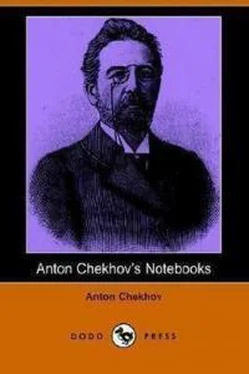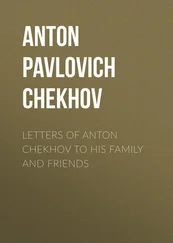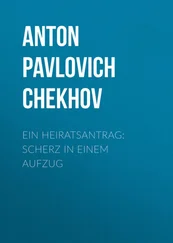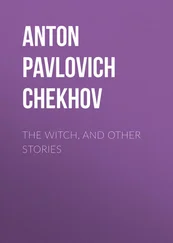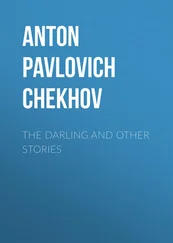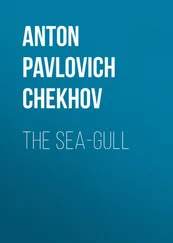Антон Чехов - Notebooks of Anton Chekhov
Здесь есть возможность читать онлайн «Антон Чехов - Notebooks of Anton Chekhov» весь текст электронной книги совершенно бесплатно (целиком полную версию без сокращений). В некоторых случаях можно слушать аудио, скачать через торрент в формате fb2 и присутствует краткое содержание. Год выпуска: 2014, Издательство: epubBooks Classics, Жанр: Биографии и Мемуары, на английском языке. Описание произведения, (предисловие) а так же отзывы посетителей доступны на портале библиотеки ЛибКат.
- Название:Notebooks of Anton Chekhov
- Автор:
- Издательство:epubBooks Classics
- Жанр:
- Год:2014
- ISBN:нет данных
- Рейтинг книги:4 / 5. Голосов: 1
-
Избранное:Добавить в избранное
- Отзывы:
-
Ваша оценка:
- 80
- 1
- 2
- 3
- 4
- 5
Notebooks of Anton Chekhov: краткое содержание, описание и аннотация
Предлагаем к чтению аннотацию, описание, краткое содержание или предисловие (зависит от того, что написал сам автор книги «Notebooks of Anton Chekhov»). Если вы не нашли необходимую информацию о книге — напишите в комментариях, мы постараемся отыскать её.
Notebooks of Anton Chekhov — читать онлайн бесплатно полную книгу (весь текст) целиком
Ниже представлен текст книги, разбитый по страницам. Система сохранения места последней прочитанной страницы, позволяет с удобством читать онлайн бесплатно книгу «Notebooks of Anton Chekhov», без необходимости каждый раз заново искать на чём Вы остановились. Поставьте закладку, и сможете в любой момент перейти на страницу, на которой закончили чтение.
Интервал:
Закладка:
* * * * *
I was apprenticed to a tailor. He cut the trousers; I did the sewing, but the stripe came down here right over the knee. Then I was apprenticed to a cabinet–maker. I was planing once when the plane flew out of my hands and hit the window; it broke the glass. The squire was a Lett, his name Shtoppev [5] Shtopov means "cork–screw."
; and he had an expression on his face as if he were going to wink and say: "Wouldn't it be nice to have a drink?" In the evenings he drank, drank by himself—and I felt hurt.
* * * * *
A dealer in cider puts labels on his bottles with a crown printed on them. It irritates and vexes X. who torments himself with the idea that a mere trader is usurping the crown. X complains to the authorities, worries every one, seeks redress and so on; he dies from irritation and worry.
* * * * *
A governess is teased with the nickname Gesticulation.
* * * * *
Shaptcherigin, Zambisebulsky, Sveentchutka, Chemburaklya.
* * * * *
Senile pomposity, senile vindictiveness. What a number of despicable old men I have known!
* * * * *
How delightful when on a bright frosty morning a new sleigh with a rug comes to the door.
* * * * *
X. arrived to take up duty at N., he shows himself a despot: he is annoyed when some one else is a success; he becomes quite different in the presence of a third person; when a woman is present, his tone changes; when he pours out wine, he first puts a little in his own glass and then helps the company; when he walks with a lady he takes her arm; in general he tries to show refinement. He does not laugh at other people's jokes: "You repeat yourself." "There is nothing new in that." Every one is sick of him; he sermonizes. The old women nickname him "the top."
* * * * *
A man who can not do anything, does not know how to act, how to enter a room, how to ask for anything.
* * * * *
Utiujny
* * * * *
A man who always insists: "I haven't got syphilis. I'm an honest man. My wife is an honest woman."
* * * * *
X. all his life spoke and wrote about the vices of servants and about the way to manage and control them, and he died deserted by every one except his valet and his cook.
* * * * *
A little girl with rapture about her aunt: "She is very beautiful, as beautiful as our dog!"
* * * * *
Marie Ivanovna Kolstovkin.
* * * * *
In a love letter: "Stamp enclosed for a reply."
* * * * *
The best men leave the villages for the towns, and therefore the villages decline and will continue to decline.
* * * * *
Pavel was a cook for forty years; he loathed the things which he cooked and he never ate.
* * * * *
He ceased to love a woman; the sensation of not being in love; a peaceful state of mind; long peaceful thoughts.
* * * * *
Conservative people do so little harm because they are timid and have no confidence in themselves; harm is done not by conservative but by malicious people.
* * * * *
One of two things: either sit in the carriage or get out of it.
* * * * *
For a play: an old woman of radical views dresses like a girl, smokes, cannot exist without company, sympathetic.
* * * * *
In a Pullman car—these are the dregs of society.
* * * * *
On the lady's bosom was the portrait of a fat German.
* * * * *
A man who at all elections all his life long always voted against the Left.
* * * * *
They undressed the corpse, but had no time to take the gloves off; a corpse in gloves.
* * * * *
A farmer at dinner boasts: "Life in the country is cheap—one has one's own chickens, one's own pigs—life is cheap."
* * * * *
A customs official, from want of love for his work, searches the passengers, looking for documents of a suspicious political nature, and makes even the gendarmes indignant.
* * * * *
A real male (mouzhtchina) consists of man (mouzh) and title (tchin).
* * * * *
Education: "Masticate your food properly," their father told them. And they masticated properly, and walked two hours every day, and washed in cold water, and yet they turned out unhappy and without talent.
* * * * *
Commercial and industrial medicine.
* * * * *
N. forty years old married a girl seventeen. The first night, when they returned to his mining village, she went to bed and suddenly burst into tears, because she did not love him. He is a good soul, is overwhelmed with distress, and goes off to sleep in his little working room.
* * * * *
On the spot where the former manor house stood there is no trace left; only one lilac bush remains and that for some reason does not bloom.
* * * * *
Son: "To–day I believe is Thursday."
Mother: (not having heard) "What?"
Son: (angrily) "Thursday!" (quietly) "I ought to take a bath."
Mother: "What?"
Son: (angry and offended) "Bath!"
* * * * *
N. goes to X. every day, talks to him, and shows real sympathy in his grief; suddenly X. leaves his house, where he was so comfortable. N. asks X.'s mother why he went away. She answers: "Because you came to see him every day."
* * * * *
It was such a romantic wedding, and later—what fools! what babies!
* * * * *
Love. Either it is a remnant of something degenerating, something which once has been immense, or it is a particle of what will in the future develop into something immense; but in the present it is unsatisfying, it gives much less than one expects.
* * * * *
A very intellectual man all his life tells lies about hypnotism, spiritualism—and people believe him; yet he is quite a nice man.
* * * * *
In Act I, X., a respectable man, borrows a hundred roubles from N., and in the course of all four acts he does not pay it back.
* * * * *
A grandmother has six sons and three daughters, and best of all she loves the failure, who drinks and has been in prison.
* * * * *
N., the manager of a factory, rich, with a wife and children, happy, has written "An investigation into the mineral spring at X." He was much praised for it and was invited to join the staff of a newspaper; he gave up his post, went to Petersburg, divorced his wife, spent his money—and went to the dogs.
* * * * *
(Looking at a photograph album): "Whose ugly face is that?"
"That's my uncle."
* * * * *
Alas, what is terrible is not the skeletons, but the fact that I am no longer terrified by them.
* * * * *
A boy of good family, capricious, full of mischief, obstinate, wore out his whole family. The father, an official who played the piano, got to hate him, took him into a corner of the garden, flogged him with considerable pleasure, and then felt disgusted with himself. The son has grown up and is an officer.
* * * * *
N. courted Z. for a long time. She was very religious, and, when he proposed to her, she put a dried flower, which he had once given to her, into her prayer–book.
* * * * *
Z: "As you are going to town, post my letter in the letter–box."
N: (alarmed) "Where? I don't know where the letter–box is."
Z: "Will you also call at the chemist's and get me some naphthaline?"
N: (alarmed) "I'll forget the naphthaline, I'll forget."
* * * * *
A storm at sea. Lawyers ought to regard it as a crime.
* * * * *
X. went to stay with his friend in the country. The place was magnificent, but the servants treated him badly, he was uncomfortable, although his friend considered him a big man. The bed was hard, he was not provided with a night shirt and he felt ashamed to ask for one.
* * * * *
At a rehearsal. The wife:
"How does that melody in Pagliacci go? Whistle it."
"One must not whistle on the stage; the stage is a temple."
Читать дальшеИнтервал:
Закладка:
Похожие книги на «Notebooks of Anton Chekhov»
Представляем Вашему вниманию похожие книги на «Notebooks of Anton Chekhov» списком для выбора. Мы отобрали схожую по названию и смыслу литературу в надежде предоставить читателям больше вариантов отыскать новые, интересные, ещё непрочитанные произведения.
Обсуждение, отзывы о книге «Notebooks of Anton Chekhov» и просто собственные мнения читателей. Оставьте ваши комментарии, напишите, что Вы думаете о произведении, его смысле или главных героях. Укажите что конкретно понравилось, а что нет, и почему Вы так считаете.
